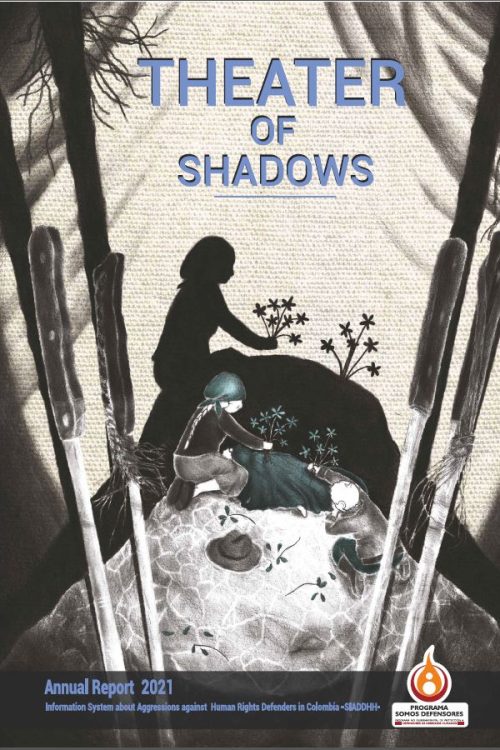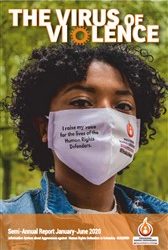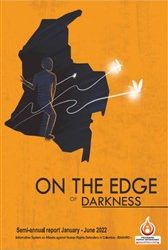
The elaboration of this annual report 2021 coincided with the final stretch of the government of Iván Duque, a period in which the panorama of violence against human rights defenders continued to worsen amid a visible deterioration of the human rights situation throughout the country.
After considerable thought, we decided to call this report “Theater of Shadows”, as we consider that it defines very well what we have experienced in these four years of aggressions against human rights defenders, since we are facing a staging in which, through effects, a very different image is projected from what really happens.
In this State staging, the socalled peace with legality simulates the implementation of the final peace agreement, when the reality is that it distorts it; the figures of aggressions against defenders are frequently distorted, trying to show a decrease when there is an increase; the public opinion is provided with high figures of clarification in the murders against defenders that in reality correspond to advances in the investigations; we are frequently presented with the hits on the heads of criminal organizations as the end of such structures, when in reality they do not stop growing numerically and expanding territorially; A CONPES document is presented to us as the public policy of guarantees, when in reality it is a revamped Plan of Opportune Action (PAO); as if all of the above were not enough, we continue to be presented as a strong democracy, when the reality of its deterioration is evident, among others due to the lack of action in accordance with its constitutional mandates by investigative and control entities such as the Attorney General’s Office, the Ombudsman’s Office and the Attorney General’s Office, which in reality move to the rhythm of the government.
In this theater of shadows in which the dramatic Colombian reality moves, aggressions against human rights defenders once again show an increase. Nine hundred and ninetysix (996) individual aggressions registered by the Somos Defensores Program in 2021, the highest figure documented by our Information System since 2010, a matter that has been reiterated in report after report in recent years. Every year we think that our records have reached the limit of horror, but it is not so, violent actions tend to increase. The 996 aggressions of the year 2021 are equivalent to the occurrence, on average, of almost three aggressions per day.
This report, following the theatrical perspective that inspires it, is divided into 4 acts: in the first act entitled The Shape of Shadows, some elements considered relevant in the reconfiguration of the dynamics of the conflict in several regions of the country are addressed, adopting in some of them the gigantic shadow of humanitarian crises that became recurrent during 2021. In contrast, there is evidence of a state response focused primarily on actions to attack figures of criminal organizations considered of high value, which according to the human rights report of the Ministry of Defense shows as a result the affectation of 8 criminal and delinquent structures, which in reality have not meant their dismantling as a criminal organization, but have implied spectacular operations that have not taken into account protection measures for the attending communities and leaderships, which have resulted, in some cases, in an increase of their risks.
Consequently, the dynamics of the reconfiguration of the conflict, which involve a variable geometry on a territorial scale, mutations and alliances between the different armed structures that are difficult to follow, remains unchanged in terms of the high degree of risk and victimization of communities, different social expressions present in the territories and their leaderships. In the meantime, while the report concludes in this section, the governmental response repeats old recipes and the power apparatuses that move behind these illegal armed structures remain unscathed in defense of their interests and economic projects.
This act also addresses the expansion of political participation modalities as one of the objectives set forth in the Peace Agreement, a fundamental piece for a democratic strengthening from and for the territories that are at risk, as well as the leaderships from the commitment with their communities and social organizations. Specifically, reference is made to the risks and obstacles of important election processes that took place or were conceived in 2021, such as the postponed elections of the members of the Community Action Boards, the election of the members of the Youth Councils and the historic election for the first time of the victims’ representatives to the House of Representatives in the framework of the Special Peace Constituencies provided for in the Peace Agreement and held on March 13 of this year, leaving a bittersweet taste as a result of all kinds of obstacles and risks that this report points out.
The second act of the report is entitled The Absurdity and it dedicates a broad analysis to the absurdity of the fact that the issuance of CONPES 4063 is considered the Public Policy of Guarantees and Respect for the Work of Human Rights Defense and Social Leadership, when in fact, according to the report, it is not designed to stop violence and criminality against human rights defenders; it is an expanded version of the Timely Action Plan PAO and maintains it as the pillar of the protection policy; it is not a policy focused on guarantees, but on physical and material protection and, in addition, it does not incorporate a human rights approach; nor did it take into account important and recognized spaces of participation such as the process of the National Roundtable of Guarantees, of which the main human rights platforms of the country are part.
This act also draws attention to the lack of transparency in the information on the implementation of Decree 660 of 2018 regarding collective protection programs and, likewise, to how the reforms introduced to the State Protection Program headed by the UNP are in the key of an austerity policy, rather than advancing in overcoming the limitations presented by the current model with a view to overcoming the markedly individual vision and the granting of material measures that makes it distinctive.
The third act is called What’s behind the curtain? and it refers to the behavior of the control and investigation entities such as the Procurator General’s Office, the Ombudsman’s Office, and the Attorney General’s Office during 2021, highlighting the poor results of their actions in the face of the serious situation of aggressions faced by defenders in the exercise of their work.
It is emphasized how this lack of an adequate state response from the control and investigation entities not only generates a deterioration of democracy which the Program has already referred to in previous reports, but also a loss of citizen confidence in them, which contributes to reinforce the silence of communities and social organizations in some territories where armed actors seek to impose themselves, thus favoring their pretensions.
In the fourth act named Darkness we present, as usual, the information regarding the behavior of aggressions against human rights defenders that the Information System of the Somos Defensores Program was able to verify. As always, the data presented do not pretend to show the totality of aggressions committed during the period but are those known and confirmed directly by the Program. It is precisely the worsening of the situation in multiple territories of the country that affects the verification process of cases and, therefore, the underreporting of aggressions may persist.
However, the analyzed figures are conclusive in terms of the deterioration of the general panorama of aggressions during the year 2021, we verified 996 individual aggressions, which means an increase of 3% in relation to the previous year. In this framework it is important to draw attention to the increase of certain aggressions such as arbitrary arrests with an increase of 73% and information thefts with an increase of 225%; threats and attacks, as in previous periods, continue to increase.
Slightly more than 75% of the aggressions are concentrated in 9 departments of the country and in Bogotá Capital District. The department of Cauca maintains the worrying trend sustained over the last 5 years of being the region where most aggressions are committed against social leaders. 84 of the recorded aggressions took place in territories considered Integral Intervention Zones ZEII in which security has been reinforced with a greater presence of troops.
Human rights activists or defenders occupy the first place as the most attacked category, with a notable increase of 62% in relation to the previous period, which is unusual and has to do with the role played by these activists in the framework of the mobilizations during the National Strike.
Although the information verified by the Program’s Information System indicates a 30% reduction in murders compared to 2020, it is still of great concern that the occurrence of murders ranges between 9 and 19 per month.
It is important to note the 4% increase in the number of murders of female social leaders. On the other hand, members of Community Action Boards and indigenous leaders share the first place in the number of murders.
By presenting this report during a presidential election, we hope that it will draw attention to the importance of including the issue of guarantees for the work of human rights defenders in their government programs.
Finally, all that is left for us to do in this presentation is to express our deep gratitude as a team of the Somos Defensores Program to all the people, organizations and cooperation agencies that continue to believe in the importance of our work and in the value of the reports we prepare.
Special thanks to all those who provided us with information for this report, especially the Early Warning System SAT of the Ombudsman’s Office, Defending Freedom is Everyone’s Business Campaign, Temblores ONG (Grita platform), Colombian Commission of Jurists CCJ, Office in Colombia of the United Nations High Commissioner for Human Rights, CINEP, ColombiaEuropeUnited States Coordination, Association of Indigenous Councils of Northern Cauca, Territories for a Dignified Life, Civic Committee for Human Rights of Meta, Sumapaz Foundation, OBSURDH, Colombia Diversa, Development and Peace Foundation FUNDEPAZ, Rebel Youth, Sisma Mujer, Corporation for Regional Development, Joel Sierra Human Rights Foundation, Cordoberxia, Permanent Committee for the Defense of Human Rights Risaralda, Social Process of Guarantees of Chocó, Mothers for Life, Indigenous Authorities of Colombia, Wayuú Women’s Force, Movice Atlántico, Association of Peasants and Landless Communities of CesarASOCAMTICE.
Our gratitude also goes to the cooperation agencies that not only support our work but also encourage and motivate us to continue, such as Misereor, Bread for the World Germany, Amnesty International, Global Witness and Front Line Defenders.
A special acknowledgement to the Royal Norwegian Embassy and Diakonia who, like us and many organizations and institutions that demand it, believe in the importance of getting these reports into the hands of many people.





